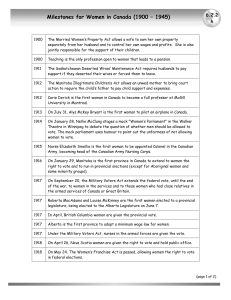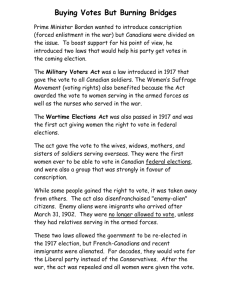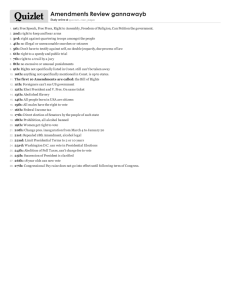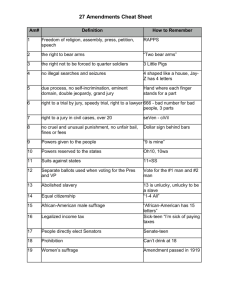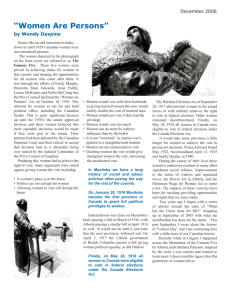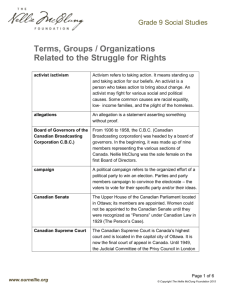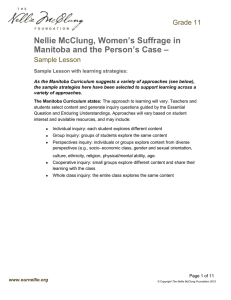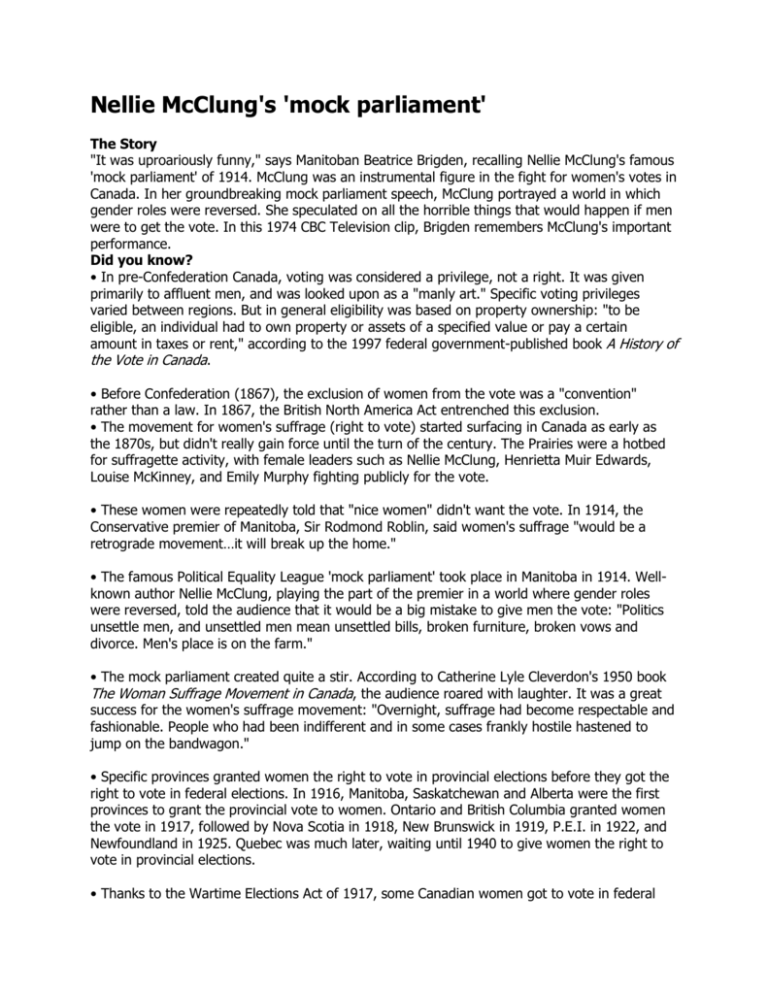
Nellie McClung's 'mock parliament'
The Story
"It was uproariously funny," says Manitoban Beatrice Brigden, recalling Nellie McClung's famous
'mock parliament' of 1914. McClung was an instrumental figure in the fight for women's votes in
Canada. In her groundbreaking mock parliament speech, McClung portrayed a world in which
gender roles were reversed. She speculated on all the horrible things that would happen if men
were to get the vote. In this 1974 CBC Television clip, Brigden remembers McClung's important
performance.
Did you know?
• In pre-Confederation Canada, voting was considered a privilege, not a right. It was given
primarily to affluent men, and was looked upon as a "manly art." Specific voting privileges
varied between regions. But in general eligibility was based on property ownership: "to be
eligible, an individual had to own property or assets of a specified value or pay a certain
amount in taxes or rent," according to the 1997 federal government-published book A History of
the Vote in Canada.
• Before Confederation (1867), the exclusion of women from the vote was a "convention"
rather than a law. In 1867, the British North America Act entrenched this exclusion.
• The movement for women's suffrage (right to vote) started surfacing in Canada as early as
the 1870s, but didn't really gain force until the turn of the century. The Prairies were a hotbed
for suffragette activity, with female leaders such as Nellie McClung, Henrietta Muir Edwards,
Louise McKinney, and Emily Murphy fighting publicly for the vote.
• These women were repeatedly told that "nice women" didn't want the vote. In 1914, the
Conservative premier of Manitoba, Sir Rodmond Roblin, said women's suffrage "would be a
retrograde movement…it will break up the home."
• The famous Political Equality League 'mock parliament' took place in Manitoba in 1914. Wellknown author Nellie McClung, playing the part of the premier in a world where gender roles
were reversed, told the audience that it would be a big mistake to give men the vote: "Politics
unsettle men, and unsettled men mean unsettled bills, broken furniture, broken vows and
divorce. Men's place is on the farm."
• The mock parliament created quite a stir. According to Catherine Lyle Cleverdon's 1950 book
The Woman Suffrage Movement in Canada, the audience roared with laughter. It was a great
success for the women's suffrage movement: "Overnight, suffrage had become respectable and
fashionable. People who had been indifferent and in some cases frankly hostile hastened to
jump on the bandwagon."
• Specific provinces granted women the right to vote in provincial elections before they got the
right to vote in federal elections. In 1916, Manitoba, Saskatchewan and Alberta were the first
provinces to grant the provincial vote to women. Ontario and British Columbia granted women
the vote in 1917, followed by Nova Scotia in 1918, New Brunswick in 1919, P.E.I. in 1922, and
Newfoundland in 1925. Quebec was much later, waiting until 1940 to give women the right to
vote in provincial elections.
• Thanks to the Wartime Elections Act of 1917, some Canadian women got to vote in federal
elections during the First World War. This allowed female citizens over the age of 21 to vote if
they were the wife, widow, mother, sister or daughter of someone serving overseas. This was
considered "temporary legislation," good for the duration of the war.
• The Women's Franchise Act of 1918 went a step further, allowing women to vote in federal
elections as long as they met the same requirements (such as property ownership and racial
requirements, for example) that would have allowed men to vote in provincial elections in their
home province.
•The Dominion Elections Act of 1920 took those provincial stipulations away and gave women
the same federal voting rights as men. Men and women could now vote in federal elections as
long as they were:
- British citizens
- at least 21 years old
- residents of Canada for at least 12 months
- residents of their riding for at least two months
• The 1920 Act did away with a number of other general voting restrictions, including property
ownership requirements. Federally, the franchise was now almost universal. The Act still
allowed for a number of racial and religious exclusions, however, including Asians and
Aboriginal Peoples.
Credits
McClung's 'mock parliament'
Medium: Television
Program: Oldtimers
Broadcast Date: Dec. 9, 1974
Guest(s): Beatrice Brigden
Duration: 4:22
Photo: National Archives of Canada
Last updated:
Nov. 16, 2004
Copyright © 2010 Canadian Broadcasting Corporation.
All Rights Reserved.






